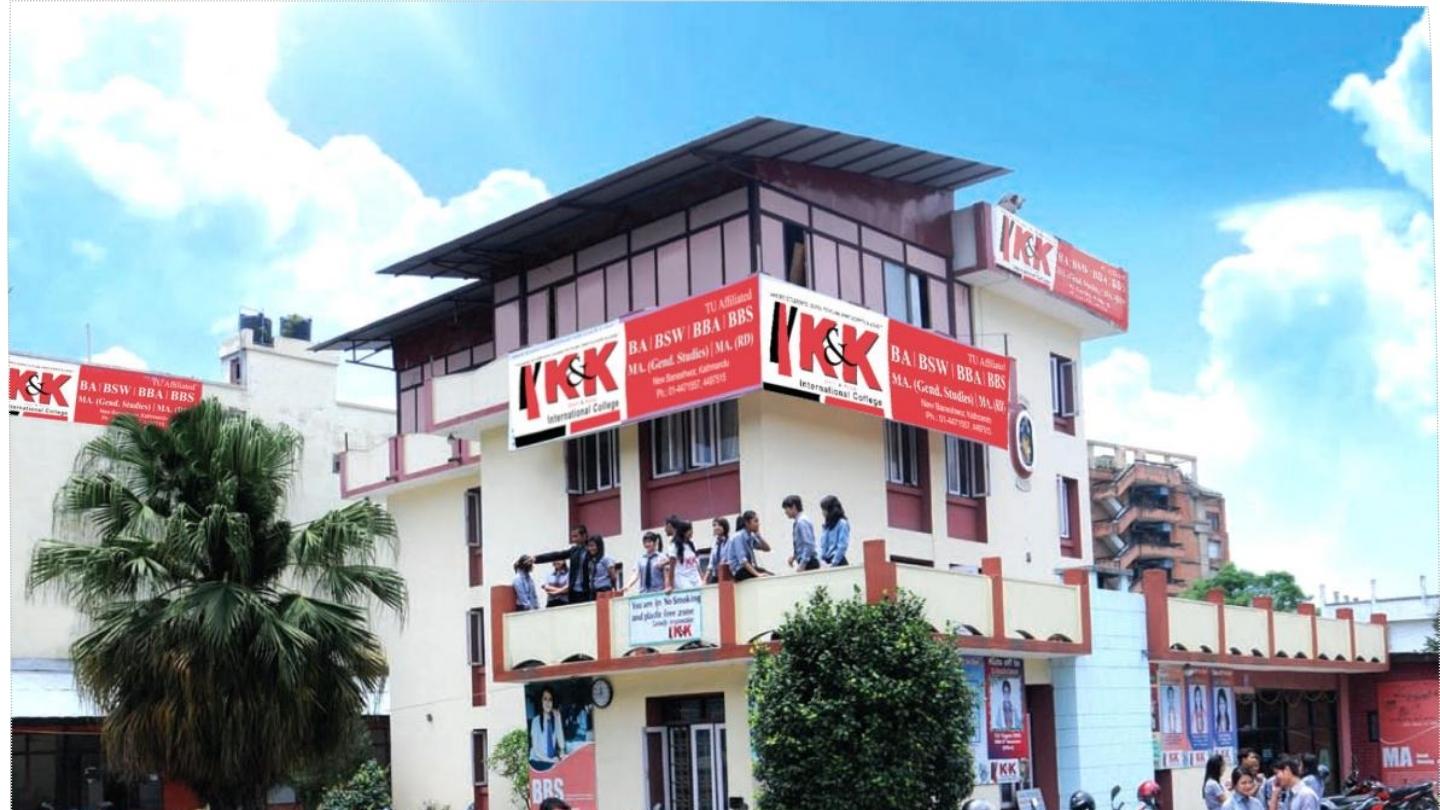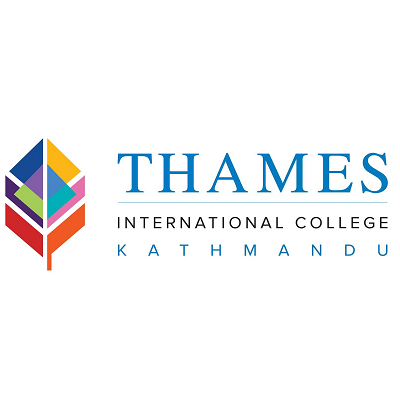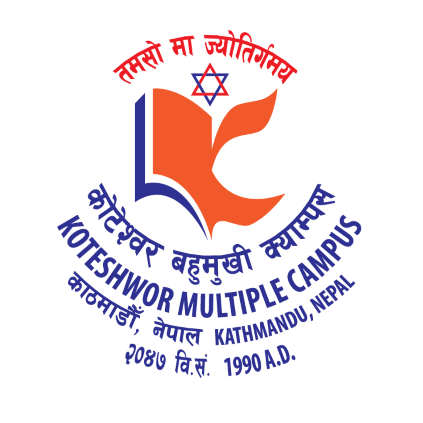Overview
BA in Psychology (BA-PSY) at K and K International College, New Baneshwor, Kathmandu
The Bachelor of Arts in Psychology (BA-PSY) at K and K International College (K&K), New Baneshwor, Kathmandu, runs under Tribhuvan University’s Faculty of Humanities and Social Sciences. The four-year structure builds a clear path from psychological foundations to applied learning.
Students study core areas of behavior and mental processes, research methods, assessment basics, and community-linked tasks that reflect Nepal’s social context.
The college location opposite the International Convention Centre (BICC) suits daily commuters, while the library, computer lab, and scheduled classrooms support steady reading, data work, and presentations.

Overview
This profile gives you accurate, course-specific information before you apply. The BA-PSY at K&K follows TU rules for curriculum, assessment, and progression. Classes focus on core theories, practical examples, short research tasks, and ethical conduct in academic work. Students start with key concepts and move toward simple assessments, project write-ups, and clear communication of findings in class.
Highlights
-
Program length: Four academic years under Tribhuvan University
-
Affiliation: Faculty of Humanities and Social Sciences (FoHSS)
-
Academic focus: Behavioral science, cognition, development, social behavior, research methods, assessment basics
-
Learning mode: Classroom study with practical tasks, short data exercises, and guided presentations
-
college support: Library access, computer lab, scheduled classrooms, clubs and sports in New Baneshwor (opposite BICC)
Curriculum Details
The curriculum advances in stages so you build knowledge in manageable steps. Each stage includes clear readings, short tasks, and compact outputs that you can file and revise across semesters.
Foundations
Students learn how psychologists study behavior and mental processes. Topics include major schools of thought, basic brain–behavior links, methods of observation, and simple measurement. Short assignments ask you to write concise explanations of key terms, compare viewpoints, and interpret brief case vignettes.
Core Domains
Classes cover cognition (attention, perception, memory, problem-solving), development across the lifespan, personality, motivation and emotion, and social influences on behavior. Quick exercises include analyzing daily decision patterns, noting memory errors in common tasks, and mapping group behavior during small activities.
Research and Methods
Students practice research basics: questions, variables, sampling ideas, questionnaires, ethics, and simple statistics. You learn to enter data into spreadsheets, compute summaries, and produce clean tables and charts. Short papers link a question to a method and report a brief result without jargon.
Assessment and Applied Work
Introductory assessment topics explain reliability, validity, and responsible test use. Students practice standardized instructions, careful timing, and neutral note-taking. Applied modules connect psychology to education, health, organizational settings, or community work through class tasks and small field-linked activities when assigned.
Communication and Academic Writing
Classes require short memos, abstracts, and slide decks. You learn to cite sources, structure a paragraph, and present a five- to ten-minute talk that highlights method and result. The goal is clarity and accurate description rather than opinionated writing.
Assessment and Attendance
Internal evaluation can include attendance, quizzes, assignments, presentations, and a term paper where applicable. End-of-term examinations follow TU rules. Students maintain steady participation and submit clean work on schedule.
Sample semester rhythm
-
Early semesters: foundations of psychology, basic statistics, academic writing, and study skills
-
Mid semesters: cognition, social behavior, development, research methods, short applied tasks
-
Later semesters: assessment basics, electives, seminar-style presentations, compact report writing
Objectives
The BA-PSY aims to help students:
-
Understand core concepts in behavior and mental processes and relate them to everyday settings.
-
Analyze small data sets with basic statistics and explain results simply.
-
Communicate in short, structured formats—memos, abstracts, slides, and brief talks.
-
Practice ethical conduct in class tasks, data handling, and citation.
-
Prepare for entry roles that value observation, documentation, and clear communication or for further study in psychology and related fields.
Scope
Graduates work in roles that benefit from careful observation, record-keeping, and people-focused tasks. Early titles include program assistant in education or health projects, HR support, school counselor’s aide under supervision, and research assistant for surveys or interviews. Some students proceed to master’s-level study in psychology or allied disciplines after building experience with clean documentation and reliable participation.
Learning Outcomes
By graduation, students typically can:
-
Define and explain key concepts in cognition, development, personality, and social psychology.
-
Collect small data sets, enter them correctly, and produce clear tables and short charts.
-
Write concise abstracts and short reports that link a question, method, and result.
-
Present findings to classmates using a short slide deck with accurate references.
-
Reflect on ethical issues in assessment, confidentiality, and academic honesty.
Skill Development Modules
The degree builds five steady habits: reading, note-making, data handling, brief writing, and clear speaking. Instructors share a plan each term that lists internal tasks and deadlines. Lab hours and library sessions support reading and charting practice.
Micro-checklist for steady progress
-
Weekly reading log: Summarize one concept in 200–300 words and list one practical example.
-
Data habit: Convert notebook tallies into a spreadsheet table and add a simple chart.
-
Writing drill: Draft a 250–400 word memo that states the question, method, and one result.
-
Speaking practice: Deliver one five-minute talk per course before mid-term.
-
Reference check: Keep a single file with citations and page numbers for all sources used.
Teaching Methodology
Classes combine short lectures with examples and guided discussion. Activities include quick quizzes, pair tasks, and brief presentations that test understanding without heavy jargon. Internal evaluation rewards consistent attendance and on-time submissions. The approach helps you move from definitions to applied interpretation in small, steady steps.
Admission Requirements
-
Eligibility: Completion of grade 12 or equivalent from a board recognized by Tribhuvan University. Documents must show subjects taken and grades/division.
-
Selection: K&K follows TU rules and may schedule a short screening or counseling session.
-
Documents: Mark sheets and character certificates for grades 10, 11, and 12; recent photos; valid ID; and any forms announced during the intake cycle.
Before you apply
-
Collect records: Scan mark sheets, ID, and photos into a single folder.
-
Track notices: Note submission deadlines and any screening dates posted for the intake.
-
Prepare a one-page note: Describe a psychology topic that interests you; this helps during counseling.
Career Opportunities
Entry roles appear in schools, NGOs, research units, and HR offices where careful documentation and basic data handling matter. Typical tasks include assisting with surveys, transcribing interviews, supporting session logistics, drafting brief reports, and maintaining secure records. Your short papers and slide decks serve as writing and presentation samples during interviews.
Scholarships and Financial Aid
Scholarship notices are issued during admission. Categories can include merit and need-based support under published rules. Students should prepare citizenship or ID, academic records, and any supporting letters requested for screening. Deadlines follow the intake calendar, so timely submission helps.
Why Choose This Course?
Students who want a clear, Nepal-focused path into behavioral science find BA-PSY steady and practical. The program builds a base in theory and then adds measured practice in data, writing, and short talks. The New Baneshwor college near BICC helps commuters, and college facilities—library, lab access, and scheduled classrooms—support regular study and on-time submissions. The small outputs you create each term become evidence of learning that you can show to employers or graduate programs.
Conclusion
The BA-PSY at K&K follows Tribhuvan University’s framework and keeps expectations clear. You learn core concepts, practice small data tasks, and write short, accurate reports. If you attend regularly, plan weekly tasks, and keep clean records, you complete the program with usable outputs—tables, briefs, and slide decks—that support both entry-level roles and future study.
FAQ
What is the length of the BA-PSY at K&K?
Four academic years under Tribhuvan University’s Faculty of Humanities and Social Sciences.
Does the curriculum include research and basic statistics?
Yes. Students learn research questions, sampling ideas, simple statistics, and clear reporting.
Are there practical or applied tasks?
Yes. Assignments include short assessments, data exercises, and seminar-style presentations.
What skills are most valued by employers?
Clear writing, reliable data entry, accurate documentation, and ethical handling of information.
Which facilities support study on college?
The library, computer lab, and scheduled classrooms in New Baneshwor help with reading, charting, and presentations.






















